Behind the Perfumed Curtain:
An Exclusive Interview with Chandler Burr, Perfume Critic for the New York Times
By Michelyn Camen

Chandler Burr took the road less traveled and ended up on a scented path. Trained in international economics, Japanese political economy and language–he has a Masters from Johns Hopkins School for Advanced International Studies and began his journalism a stringer in The Christian Science Monitor’s Southeast Asia bureau. Somewhat by chance Burr became known for his science writing, first on sexual orientation, and then on smell, which led to his current position– The New York Times’s perfume critic. He is the author of two books, including the Emperor of Scent, and will be releasing his third (and perhaps his most provocative) book, The Perfect Scent: A Year Inside the Perfume Industry in Paris & New York on January 22, 2008.
I met Chandler Burr a few months ago, when I attended his famous ‘Six Course Scent Dinner’ at the Carlyle Hotel in NYC. We were a group of twenty; perfumistos all, including Francois Duquesne, President of L’Artisan Parfumeur, Karen Dubin, Founder of Sniffapalooza and my favorite ex-editrix ,Kim Van Dang (formerly of Instyle Magazine).
The dinner was a gourmand’s dream; food and scents. Every course was tied to culinary ingredients or materials used in creating fragrance, so we sniffed scented strips of white paper, trying to guess what we were smelling. We drank Dolce & Gabbana Light Blue Martinis and after an outstanding dinner prepared by Executive Chef Jimmy Sakatos, everyone indulged in confections based on the ingredients found in Tom Ford’s Black Orchid , Missoni’s Aqua and Thierry Mugler’s Angel.
In between courses and sniff strips, we drank sake, cocktails and fine wines. By the fourth course (cocktail) I would have detected truffle oil in Aqua Velva. Never the shy one, I planted myself in front of CB and declared, “Chandler, WE are doing an interview for Beauty News Magazine”.
This exclusive BN interview and ‘insider look’ into the pages of Chandler Burr’s upcoming book, The Perfect Scent: A Year Inside the Perfume Industry in Paris & New York, is brought to you due to the astonishing fact that I was sober enough to hang onto and actually find Chandler’s business card the day after…
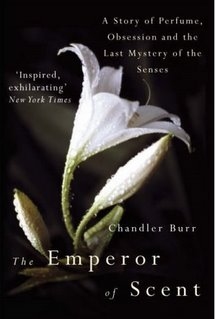
BN: We’ve heard of movie critics, restaurant critics, fashion critics, but are perfume critics something new?
CB: Actually they *are* new, but I only discovered the idea in writing my previous book, “The Emperor of Scent,” about smell researcher and perfume genius Luca Turin. I’d met Luca by chance in a train station in Paris, become interested in his new biological theory of human smell, and he mentioned early on that he’d written a book called “Parfum: Le Guide,” but it actually took me a while to understand what it was: a critical guide that treated perfume as art. I thought: “Huh!…” I started reading it, and I was fascinated.
“Emperor” led to my editor at The New Yorker, Daniel Zalewski, proposing that I watch from behind the scene the creation of a perfume—that perfume turned out to be Un Jardin sur le Nil from Hermès and that New Yorker article the basis of half my upcoming book—and that in turn led to Stefano Tonchi, style editor of The New York Times Sunday Magazine and T, suggesting I work for The Times. I said, “Great—I want to be your perfume critic.” He blinked once, grinned, and said, “I love it! We’ll do it!”
When my column, “Scent Notes” started, it was Stefano who stated publicly, “The Times will be the first to cover the fragrance industry and perfume in the way it does movies, books, and theater.” He’s been completely behind it from the start. Our belief is that the creation of fragrance is one of the highest art forms crafted for the senses, absolutely equal to painting, the art created for sight, and music for hearing, and we’re treating perfume as the art that it is. Every other true art has a serious criticism. Perfume should as well. Perfume as an aesthetically rich and complex art, deeply anchored in culture, with its own history and aesthetic schools.
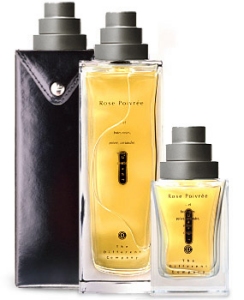
BN: You rate fragrances on a 1-5 scale. What elements are essential to to award a scent a five star review? What are some fragrances that have earned five stars?
CB: I give or deduct stars based on essentially three criteria that are more or less objective and two elements that are purely subjective. Objectively, diffusion—can the perfume can be smelled only by putting your nose on skin or does it lift off skin?—persistence—how long does it last on skin—and evolution—does you start in a field of flowers and decay in 30 minutes into a vat of chemicals or has the perfumer created a structure, using good materials in an expert manner, that is both stable and beautiful for 10 hours—are relatively objective. They’re pretty clear to everyone. The subjective judgments are innovation and beauty, and that’s just me. I gave Comme de Garcons 2 Man five stars because to me it simply hits every single point perfectly. You just can’t do better than this perfume. It’s like watching the Russian gymnast whose every move is flawless. Rose Poivree from The Different Company is five, Light Blue by Dolce & Gabbana as well. All three are completely different, and all three perform perfectly and hit the subjective criteria with total precision.
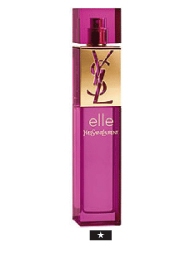
BN: Now, for those fragrances that earn a 1…that can hurt their sales, at least with those who hold your criticisim in high regard. To quote Shakespeare, how “…uneasy rests the head that wears a crown”?
CB: Honestly, I wonder how much influence I do (or don’t) have. I know that Scent Notes has an impact, in particular on niche perfumes, which is why, to be honest; I’m less likely to review niche perfumes if I know that I’m going to give it a one or a zero stars. Why destroy something like that? On the other hand, I just gave Elle by Yves Saint Laurent a one star because I consider it absolutely below Yves Saint Laurent to put out a hyper-commercial, soulless thing like that.
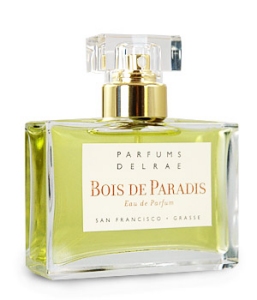
I was told that my five stars for Bois de Paradis by Parfums DelRae hugely boosted sales, and so did my talking about Light Blue on The Today Show. Which is terrific. And yes, I sweat it when I give out a bad rating. I take those very, very seriously, never give them lightly, and always remind those who ask: It’s just one guy’s view.
BN: For the record, I just want to state that when I gave Bois de Paradise, the “scent masterpiece” Best Scent 2007 award recently on behalf of Beauty News, I had no idea you had given it five stars. Please confirm that for our readers.
CB: I never told her! But my ratings are public…
BN: Very supportive. Is your column with The New York Times expanding?
CB: It is. I’m delighted to say that Scent Notes is now not only in printed form in T: Style Magazine but also weekly on the new New York Times fashion blog, The Moment, at themoment.blogs.nytimes.com . Elle was my first weekly review. After I finish these questions, I’m going to jump into my review of the new Gucci by Gucci. It’s going to be a very positive one.
BN: You are a celebrated author and on January 22, you will be introducing your latest book “The Perfect Scent: A Year inside the Perfume Industry in Paris & New York.” Can you give us a preview?
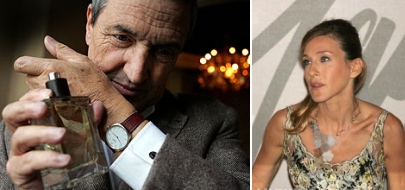
CB: “The Perfect Scent: A Year Inside the Perfume Industry in Paris & New York” will be published January 22 by Henry Holt, Inc. It’s two parallel, intertwined stories, the first about the year I spent for The New Yorker magazine in Paris behind the scenes at Hermes watching legendary perfumer Jean-Claude Ellena create the Hermes scent “Un Jardin sur le Nil“; and the second about a year (one that started with an article for The New York Times in this case) inside Coty with Sarah Jessica Parker, watching Sarah Jessica direct her perfumers in the making of “Lovely.”
BN: Please contrast the experiences for our readers behind the scenes between working with two legends- one of fragrance and one of celebrity.
CB: They were completely different
because, among other reasons—and this is what I, as the author, loved;
the stories contrast beautifully—one is from the point of view of a
perfumer, Jean-Claude Ellena at Hermès. The other is told from the point of view of the creative director, Sarah Jessica Parker,
whose experience, approach, perspective, everything you can name is
markedly different. The way the French approach perfume—I was in Paris
and Grasse, sitting in on meetings in 15th century buildings and
walking through fields that for centuries had been growing flowers to
make perfume materials—differs from the way Americans do it (Sarah
Jessica and Coty worked with IFF in its corporate headquarters on West
57th Street.) I’m absolutely not saying the French model is better.
It’s not. It’s different, but at the end of the day both the French and
the Americans produce brilliant successes and total disasters. I was
just lucky enough that the two perfumes whose stories I tell are
substantive, innovative, thoughtful
works of art.
BN: Please share with our readers’ one of the most exciting things about watching a master like Jean Claude Ellena?
CB: I’ll tell you one that will surprise you: The amount of agony the guy goes through. I was astonished at the degree of second-guessing of himself (and third and fourth), at the worrying about whether this material was perfectly dosed or that one well-chosen or how to fine-tune the various technical aspects of the juice. He actually suffers through these things, but he’s a true perfectionist.
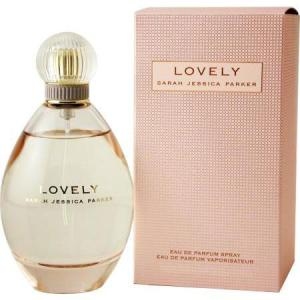
BN: How involved was Sarah Jessica Parker in developing Lovely?
CB: Completely. Which is, of course, the only reason Coty invited me inside to watch the process. In “The Perfect Scent,” I actually lay out Paris Hilton’s perfume licensing contract—someone sent it to me—and it is clear that Hilton had no more to do with her perfumes than cashing the checks. Sarah Jessica was so involved it actually surprised Coty. As you’ll see in the book.
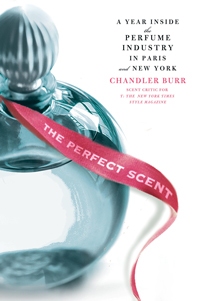
BN: Will there be a media tour, a book signing debut at a retailer? Will it be open to the public? Where can our readers buy it online, or at the bookstore?
CB: Until the pub date—January 22, 2008 —if you reserve it on Amazon or on my own site www.chandlerburr.com. The hardcover is $16.50 as opposed to $25 after publication. And definitely, I’ll be going on tour, open to the public. Henry Holt is scheduling that right now, but I’ll be in NYC, L.A., Phoenix, Minneapolis, San Francisco, and on.
BN: When can it be preordered?
CB: Right now! And until Jan 21. After Jan 21, no more pre-orders, and the price jumps 40%.
BN: Chandler, what is something very few people know about you…fess up!
CB: I wrote a dramatic play that premiered in Washington D.C. called Exquisite, that sold-out for the entire run of 16 weeks.
BN: Ahhh, the road not taken…Thank you Chandler.


